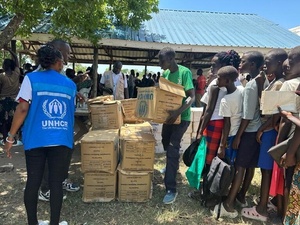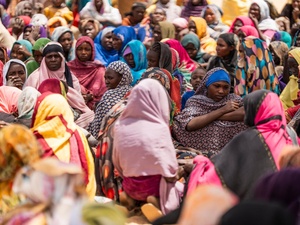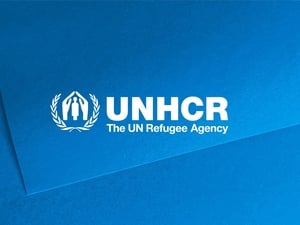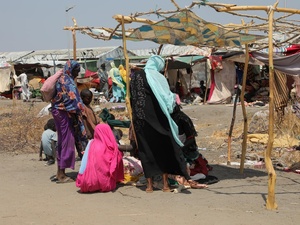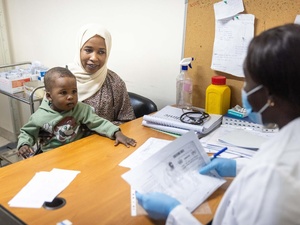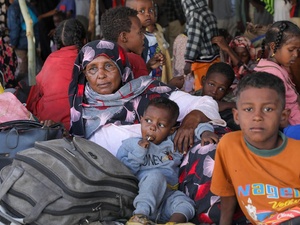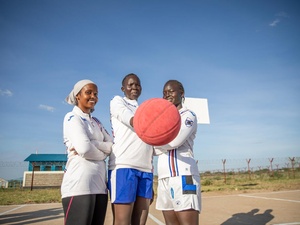Humanitarian situation improving in Ethiopia, continued challenges in Somalia
Humanitarian situation improving in Ethiopia, continued challenges in Somalia
Together with our partners, UNHCR has been making progress in delivering health and nutrition services to Somali refugees in the Dollo Ado camps in Ethiopia. The measles vaccination campaign, completed two weeks ago, has resulted in a sharp decrease in the number of new cases and related fatalities. Mobile health teams are reaching many families who previously had no access to medical services. In Kobe camp, there has been a steady decline in the crude mortality rate, which is now estimated to be 2.1 per 10,000 people per day, down from a rate of 4 to 5 per 10,000 a few weeks ago.
When Ethiopia's newest camp, Hilaweyn, opened six weeks ago, the overall malnutrition rate among newly arrived refugee children under the age of 18 was 66 per cent. The rate has now dropped to 47 per cent. Across all camps in Dollo Ado, the overall rate is around 35 per cent as the nutritional feeding programmes for refugee children have been able to reach the most vulnerable. We are continuing these feeding programmes as the rate of malnutrition is still high, particularly among children under the age of two.
On average 300 Somalis continue to cross the border daily into Dollo Ado from the areas of Bay, Gedo and Bakool. New arrivals tell us that conditions in Somalia are still precarious, with the majority of livestock having now perished and food hard to come by. Some of them are also directly fleeing continuing conflict and violence.
In Mogadishu, the incidence of diarrhea and measles among internally displaced Somalis (IDPs) remains a concern and the estimated mortality rates among children under the age of five continue to be alarmingly high (15.43 / 10,000 / day in August, 14.09 / 10,000 / day in July). Malnutrition rates have also worsened.
UNHCR has undertaken a number of fact-finding missions to some of the more than 180 makeshift camps in the Somali capital where distributions of our emergency aid items were carried out. We aim to undertake up to 10 fact-finding missions a week to IDP settlements. Despite a somewhat improved security situation in Mogadishu in recent weeks, we still have no access to many parts of the capital. Outside the protected compound of the Mogadishu International Airport, our staff are still forced to move with secured convoys.
In the Tarbuush and Al Adala settlements, internally displaced people now have improved shelter conditions and can use the new kitchen sets to prepare food from the rations they have received. Blankets and sleeping mats were also immediately put to use. Our team also visited IDPs at the bombed-out Cathedral site in Hamarweyne District.
Drawing on lessons learned from the 1992 famine when infant mortality spiked during the colder weather and rains in October, UNHCR is working with UNICEF on the distribution of some 60,000 UNHCR blankets to mitigate the effects of the weather and risk of hypothermia in settlements across Mogadishu and neighbouring regions. This should significantly reduce the risk of hypothermia among displaced children.
The blankets are currently in stock in our warehouse in Mogadishu while an additional 20,000 UNHCR Emergency Assistance Packages (EAPs) are expected to arrive in Mogadishu port by sea from Dubai in the coming days.
We are also moving to implement transitional shelter solutions before the rainy season, and procurement of shelter material and extra-large (4m by 7m) plastic sheeting is under way. These can completely cover the traditional buul shelters constructed by IDPs and provide additional protection from the elements. The total cost of both plastic sheeting responses is US$ 1 million. These are being distributed in Mogadishu and Lower Shabelle, which is the next largest concentration of IDPs outside the Somali capital.
Separately, UNHCR has received a $30 million grant from the World Bank to help over a half a million refugees in camps near the Somalia border in Ethiopia and Kenya get access to nutrition, health and sanitation services. Details can be found in a separate press release.
Learn more about the crisis in the Horn of Africa and how to contribute by visiting the UNHCR Horn of Africa emergency donation site. For the latest updates follow us on Facebook or Twitter.
For further information on this topic, please contact:
- In Kenya, Nairobi UNHCR regional office: Andrej Mahecic on mobile +254 734 330 023
- In Kenya, Nairobi: Needa Jehu-Hoya on mobile +254 734 564 018
- In Ethiopia: Laura Padoan on mobile + 252 618 533 590
- In Geneva: Fatoumata Lejeune-Kaba on mobile +41 79 249 34 83



